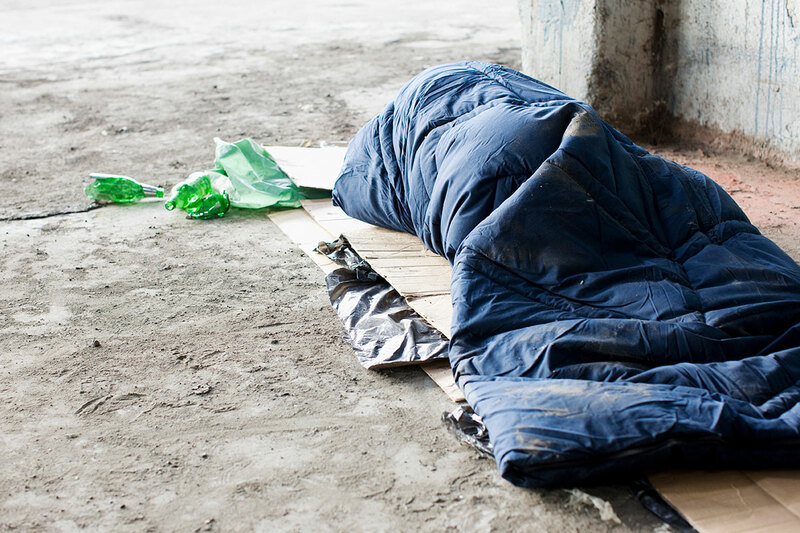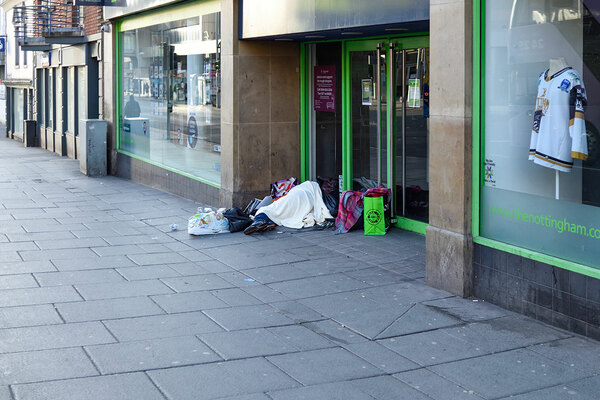You are viewing 1 of your 1 free articles
 Rick Henderson
Rick HendersonRick Henderson is CEO of Homeless Link the national membership body for the homelessness sector in England with over 800 members. Prior ...more
‘Any short-term success in tackling homelessness won’t be sustained unless we act on the reasons why so many people needed hotels in the first place’
The media is buzzing with stories hailing the end of rough sleeping, but urgent action is needed to help local areas plan and pay for the next phase and avoid a potentially catastrophic cliff-edge once sites begin to close, writes Rick Henderson
After six weeks in lockdown, the homelessness sector is emerging from the immediate public health emergency created by COVID-19.
The directive from government to bring ‘everybody in’ has seen an estimated 5,400 people offered hotel and similar accommodation.
Thousands more have continued to be supported in hostels, Housing First and other accommodation services to socially distance safely and cope with the anxiety and disruption this crisis has caused to their daily lives.
The incredible efforts of our members, along with decisive action from local and national government, have undoubtedly saved lives.
They also paved the way for unprecedented local partnership working, community innovation and the successful engagement of many individuals with complex needs for the very first time.
As frontline services adjust to this new reality, the media is buzzing with stories hailing the end of rough sleeping and celebrating changes over a matter of weeks that would normally take years. The big question of “what next?” and how we capitalise on this is at the front of people’s minds.
While acknowledging the extraordinary efforts and achievements over recent weeks, I am not the first to urge caution on how we measure them against our aim of ending homelessness.
Yes, we now have an opportunity to ensure everybody accommodated during this emergency never returns to the streets.
This chance must not be wasted – but our ambition must extend well beyond this if we are to see long-lasting change.
More than ever, the coronavirus crisis has exposed systemic cracks that have existed for years; the under-supply of affordable housing, health inequalities and a precarious welfare system are now even more visible.
“Any success now won’t be sustained unless we act on the reasons why so many people needed hotels in the first place”
Many will be watching how the government’s new rough sleeping taskforce will approach this question of ‘what next?’.
At Homeless Link, we’ve been hearing about what members see as the critical issues. Urgent action is clearly needed to help local areas plan and pay for the next phase and avoid a potentially catastrophic cliff-edge once sites begin to close.
But we also urge the taskforce to take the long-term view. Any success now won’t be sustained unless we act on the reasons why so many people needed hotels in the first place.
A successful transition and recovery should be guided by the following principles:
Nobody returns or is new to the street
Everybody who entered emergency accommodation during the pandemic must have somewhere suitable to live when they leave. Local authorities will need to better utilise existing stock and open up new supply by expanding approaches such as Housing First.
We must also consider the thousands of people already in unsuitable temporary accommodation before this crisis began and those finding themselves newly homeless in the fall-out of the pandemic.
Plans must take account of expected spikes in housing need and ensure councils’ duties to prevent and relieve homelessness are fulfilled.
National measures to increase access to social housing, maintain the Local Housing Allowance rate at a minimum of 30% and strengthen the welfare safety net will be needed to back this up.
Everybody receives an appropriate offer of support
We must maintain the trust and relationships developed with individuals during the crisis and put in the place the right support, for example around health, well-being and maintaining tenancies, for as long as it is needed.
However, frontline services faced an estimated £1bn funding gap before the lockdown and the financial impact of COVID-19 is pushing many to the limit. Unless government takes a long-term view about the revenue funding needed, we are setting ourselves up to fail.
No return to business as usual
The interdependence of public and individual health, and of health and homelessness, has never been clearer.
We need to transform service design, funding and commissioning to produce truly integrated homelessness systems, building on the multi-agency collaboration with the NHS, Public Health and other partners over the past few weeks.
Where this collaboration is yet to happen, it must be made a priority.
“If we are to look back on this crisis as a defining period where meaningful progress was made in our ambition to end homelessness, an increased commitment from across national government will be required”
Finding solutions will rely on every one of us playing a part.
Efforts are already underway to free up new supply, redesign service delivery, and support day-services to re-establish provision in a world where social distancing may remain for some time. We have many of the solutions already.
Where we don’t, the sector has a good track record of finding them.
If we are to look back on this crisis as a defining period where meaningful progress was made in our ambition to end homelessness, an increased commitment from across national government will be required. As a good place to start, Dame Louise Casey’s taskforce should consider the needs of everyone experiencing homelessness.
We stand ready to support this work in any way we can.
We must judge what happens next, not just against whether we can end rough sleeping for those who were ‘brought in’ but also by how well we do in preventing homelessness for the many more now at risk.
Rick Henderson, chief executive, Homeless Link












